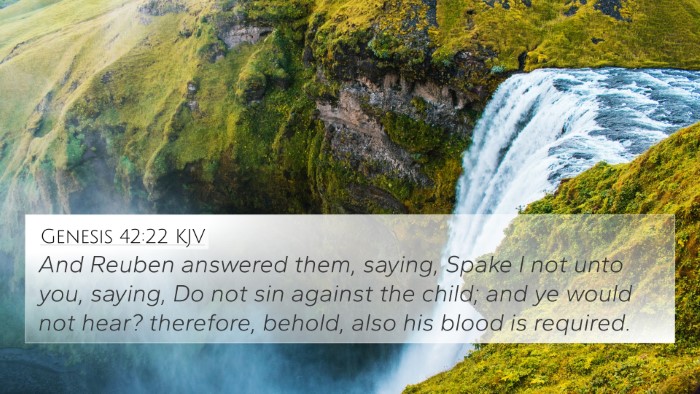Understanding Genesis 37:21
Genesis 37:21 states, "But when Reuben heard it, he delivered him out of their hands; and said, Let us not kill him." This verse captures a pivotal moment in the story of Joseph, where brotherly dynamics and moral considerations play a key role. Below, we summarize the insights from various commentaries, highlighting the significance of this verse in the biblical narrative.
Summary of Commentary Insights
This verse reveals Reuben's intention to save Joseph from the murderous plot of his brothers. The moral complexity of this situation, as explored by commentators, showcases themes of sibling rivalry, mercy, and the consequences of familial strife.
Matthew Henry's Commentary
Reuben's Role: Matthew Henry emphasizes Reuben’s intervention as a sign of his moral compass amidst chaos. He recognizes the danger in the brothers’ plan and steps in to divert their intention from fratricide. This act shows Reuben's innate sense of righteousness, underscoring the importance of compassion and leadership within families.
Albert Barnes' Commentary
Preservation of Life: According to Albert Barnes, this verse highlights the gravity of life and the moral responsibility not to take innocent life. Reuben, the firstborn, feels the weight of his position and acts decisively to prevent a greater sin. His suggestion to spare Joseph's life reflects the principle of mercy, which echoes throughout the Bible.
Adam Clarke's Commentary
Fratricidal Instinct: Adam Clarke discusses the overwhelming emotions that can lead to devastating actions. Clarke notes that Reuben’s plea reveals an inner struggle among the brothers fueled by jealousy and anger. His intervention is significant as it sets the stage for future events, ultimately leading to family reconciliation and the overarching plan of providence in Joseph's life.
Key Themes and Connections
In summary, Genesis 37:21 contributes richly to the narrative of Joseph and his brothers. The themes of mercy, divine providence, and the complexities of human relationships are woven throughout this story. Below are several relevant cross-references that enhance our understanding of this verse:
- Exodus 20:13 - “You shall not murder.” This commandment underscores the moral imperative that Reuben addresses.
- Matthew 5:21-22 - Jesus extends the call against murder to the heart, emphasizing that anger can lead to destructive choices.
- James 1:20 - “For the anger of man does not produce the righteousness of God.” This connects with the emotions present in Joseph’s brothers.
- 1 John 3:15 - Loving one another prevents murder motivated by hate, suggesting a fundamental principle of Christian ethics.
- Genesis 42:22 - Later, the brothers express guilt over their treatment of Joseph, indicating deep moral reflection.
- Proverbs 16:7 - “When a man's ways please the LORD, he makes even his enemies to be at peace with him.” Reuben’s actions reflect a righteousness that may avert chaos.
- Genesis 50:15-20 - Joseph’s eventual mercy towards his brothers highlights the overarching theme of forgiveness and redemption.
- Romans 12:19-21 - “Vengeance is mine, I will repay.” This verse correlates to understanding divine justice over human retribution.
- Matthew 18:21-22 - Peter’s questioning about forgiveness connects with the themes of mercy and grace witnessed in this narrative.
Conclusion
The verse Genesis 37:21 serves as a significant point of reflection on moral dilemmas faced by individuals in positions of familial responsibility. Through the lens of cross-referenced scriptures and insights from trusted biblical commentators, readers can appreciate the deeper implications of mercy, moral action, and the providential workings of God within the complex tapestry of human relationships.
Tools for Further Study
To enhance understanding and exploration of biblical connections:
- Bible concordance: A helpful resource for finding specific verses and themes.
- Cross-reference Bible study: Utilize tools that highlight interconnected scriptures to grasp thematic Bible verse connections.
- Comprehensive Bible cross-reference materials: Such resources can aid in comparative Bible verse analysis.
Understanding the connections between Bible verses, such as those found in Genesis 37:21 and its thematic implications, contributes to a richer biblical theology and personal application.







